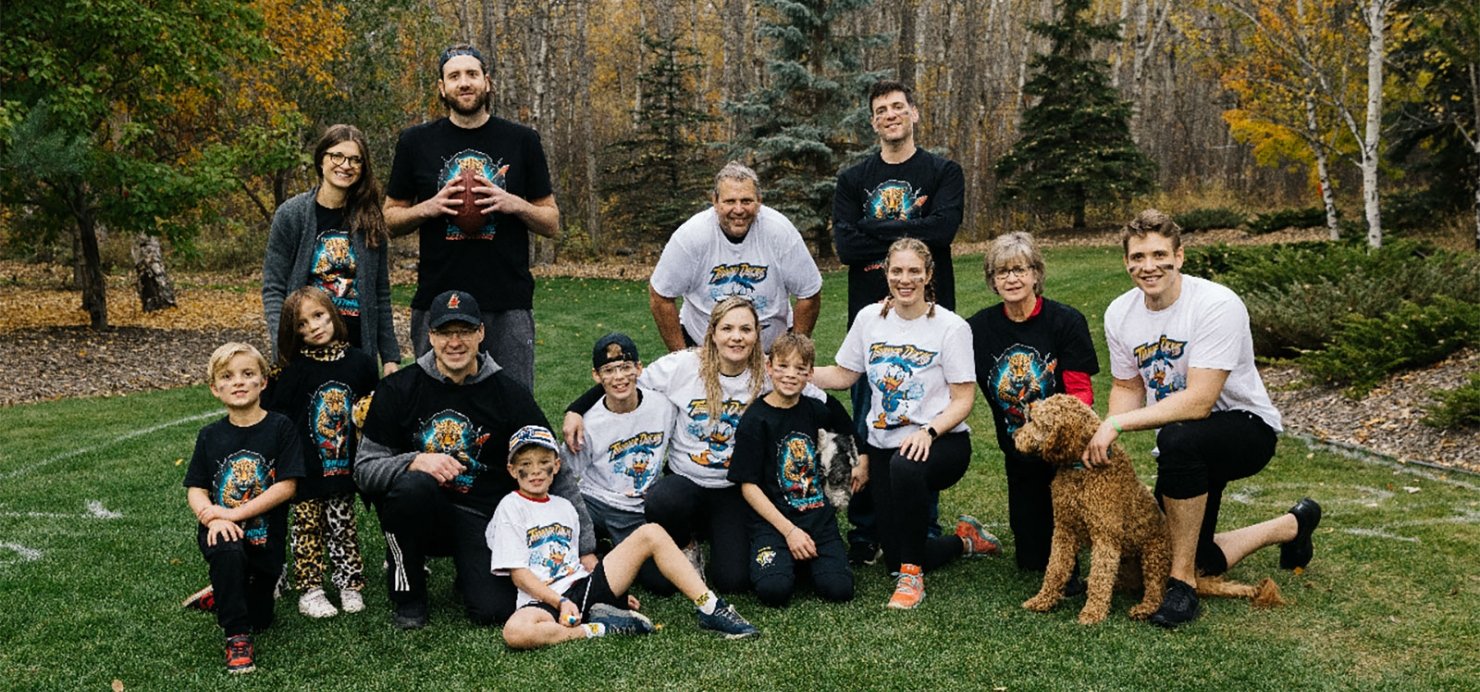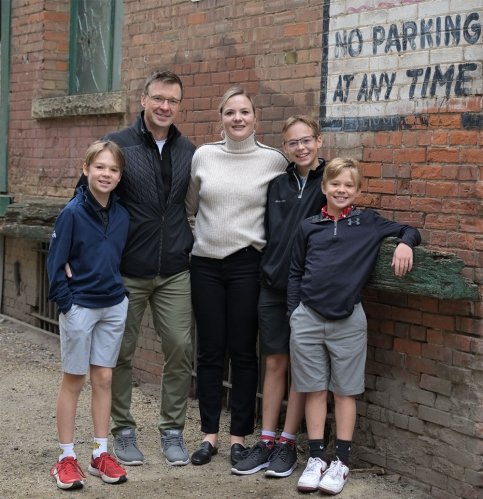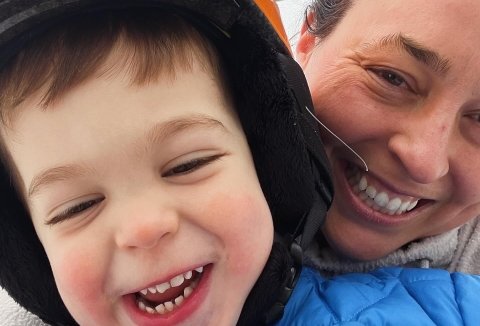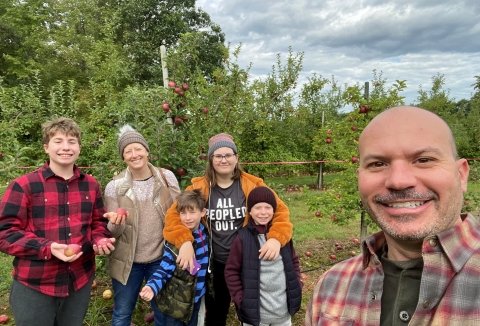Lynch syndrome leads to multiple cancer diagnoses for one family
Lynch syndrome brings the Scragg family from Canada to Dana-Farber and inspires them to give back to the place that saved their family’s life.

The entire Scragg family smiles for a picture during a game of football.
In most cases, a cancer diagnosis affects the whole family. For the Scraggs, that’s especially true.
In early 2020, upon the insistence of his sister, Dave Scragg decided to undergo testing for Lynch syndrome, a common and often under-diagnosed inherited genetic mutation that increases an individual’s risk for developing cancer to as high as 80 percent. Dave had never heard of the disorder nor considered it a possibility, despite his father and grandfather both developing cancer and he himself being treated for skin cancer in his forties.
When Dave tested positive for Lynch syndrome, he was shocked. He urged the rest of his family to undergo testing, which led to a positive diagnosis for two of his four children, Mark, 32, and Meagan, 35. Dave, Mark, and Meagan immediately began taking precautionary measures, including annual endoscopies, colonoscopies, and skin screenings. Meagan underwent a preventative hysterectomy.

Despite their efforts, cancer soon caught up to the Scraggs. In May 2021, Mark began experiencing fatigue and stomach pain, and after moving up his second yearly endoscopy and colonoscopy, he was diagnosed with stage IV stomach cancer. Shortly after, in October 2021, more bad news arrived: Meagan had stage III small intestine cancer.
When several specialists in the Scragg’s home province of Alberta, Canada, gave Mark poor prognoses, his youngest sister, Kelly, looked for a place to get a second opinion. That’s when she found Dana-Farber Cancer Institute, home of the Lynch Syndrome Center led by Matthew B. Yurgelun, MD, FASCO, CGAF. Not only could Mark seek expert treatment for his stomach cancer, but also his care would be tailored specifically toward individuals with Lynch syndrome, supported by world-class research and state-of-the-art diagnostics.
Soon after Mark arrived at Dana-Farber, additional scans showed the cancer had spread to his lymph nodes, making surgery unviable. He was prescribed a potent combination of chemotherapy and immunotherapy and sent back to Canada for care, with the Center staying in regular contact with his Canadian oncology team to track his progress. In August, after just three months of treatment, Mark’s scans were completely clear.
By the time Meagan’s diagnosis came that October, the Scraggs knew exactly where to go. Meagan underwent surgery at Dana-Farber and returned home for chemotherapy, like Mark. The Lynch Syndrome Center continued to work with the family’s care practitioners and oncologists in Canada to provide support for the screening and care of Mark, Meagan, and Dave, even providing guidelines for their doctors to use in monitoring their cancer risk moving forward.

Today, both Meagan and Mark are done with active cancer treatment, and they and their father continue to receive ongoing screening and bloodwork back in Canada, with Yurgelun and team closely monitoring their care from over 3,000 miles away.
Grateful to Dana-Farber and the Lynch Syndrome Center for saving the lives of not one but three of their own, the Scragg family is determined to support cancer research any way they can. Through a series of gifts over the last four years, the Scraggs have contributed $500,000 to Lynch syndrome research, motivated to expand efforts to include all types of Lynch syndrome-related cancers, like those that impacted their family. While colon is the most commonly occurring type, cancers connected to Lynch syndrome include rectal, uterine, ovarian, urinary tract, stomach, small intestine, pancreatic, and other malignancies, including certain forms of skin cancer.
With support from families like the Scraggs, the Center has been able to expand collection efforts for the Lynch Syndrome Registry and Biobank, established by Dana-Farber, to include data and specimens from both Lynch syndrome-related cancer survivors and “previvors,” or those at risk who have not yet been diagnosed. The registry and biobank are invaluable tools for researchers to cross-reference various health profiles and look for clues to the development of cancer. Funds also help the Lynch Syndrome Center team develop more effective and less invasive early detection tests and new prevention methods for Lynch syndrome-related cancers.
“Dr. Yurgelun and the Lynch Syndrome Center gave our family hope when we needed it most,” says Lori Scragg, Dave’s wife and mother of Mark and Meagan. “We believe we have been blessed to be a blessing, and by giving back, we feel that it will continue to provide research and knowledge so that many other families will also have hope.”
Roughly 1 in 300 people in the United States have Lynch syndrome. However, most individuals who possess an inherited mutation in one of the five Lynch genes either don’t know it or only find out after developing cancer. If you think you could be at risk, don’t wait to get screened.
Join the Scragg family and help support Dana-Farber Cancer Institute’s lifesaving mission to provide compassionate patient care and groundbreaking cancer research for children and adults.
Since 1948, the generosity of millions of people has helped the Jimmy Fund save countless lives and reduce the burden of cancer for patients and families worldwide through community-based fundraising events and other programs that solely and directly benefit Dana-Farber. Learn more about how you can get involved at JimmyFund.org, and follow the Jimmy Fund on Facebook, X (formerly Twitter), and Instagram: @TheJimmyFund.


